

Can We Become Addicted to Stress? In 2011, Americans rated their personal stress levels an average of 5.2 out of 10.
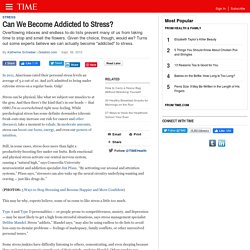
And 22% admitted to being under extreme stress on a regular basis. Gulp! Stress can be physical, like what we subject our muscles to at the gym. And then there’s the kind that’s in our heads — that OMG I’m so overwhelmed right now feeling. While psychological stress has some definite downsides (chronic freak-outs may increase our risk for cancer and other diseases), take a moment to exhale. Young adults spend more than six hours per day feeling ‘stressed out’, finds Mental Health study. Young adults spend more than six hours a day "stressed out", a study has found.
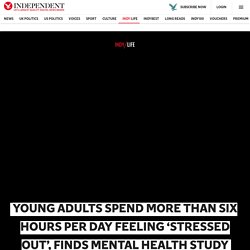
A poll of 1,000 18-25-year-olds found money, appearance and career worries as well as fears about the future mean a large chunk of their time is spent feeling anxious or under pressure. But one in 10 feel they have no-one to turn to discuss their concerns, leaving them to face their fears alone. Download the new Independent Premium app Sharing the full story, not just the headlines. The Most Stressed-Out Generation? Young Adults.
The latest survey shows stress is on the decline overall but still hover above healthy levels, especially for young adults.
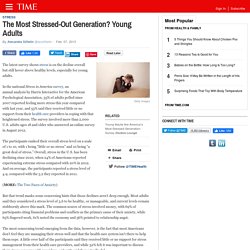
In the national Stress in America survey, an annual analysis by Harris Interactive for the American Psychological Association, 35% of adults polled since 2007 reported feeling more stress this year compared with last year, and 53% said they received little or no support from their health care providers in coping with that heightened stress. The survey involved more than 2,000 U.S. adults ages 18 and older who answered an online survey in August 2012. The participants ranked their overall stress level on a scale of 1 to 10, with 1 being “little or no stress” and 10 being “a great deal of stress.”
Overall, stress in the U.S. has been declining since 2010, when 24% of Americans reported experiencing extreme stress compared with 20% in 2012. And on average, the participants reported a stress level of 4.9, compared with the 5.2 they reported in 2011. Stress in young adults. What Is FOMO? Fear Of Missing Out (FOMO) How FOMO Impacts Teens and Young Adults. "You totally missed out!
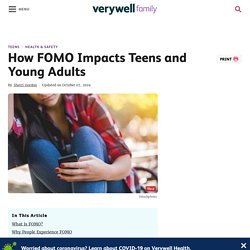
" This sentence strikes fear in the hearts of teens more than almost anything else you can say to them. In fact, missing out on something bothers most teens so much there is even a special word for that sick feeling they get in the pits of their stomachs: FOMO. Top 10 Life Management Skills Young Adults Need for Independence - New Directions for Young Adults. If you’ve been an adult for a long time, it can be hard to remember what it was like before the basic skills of adulthood felt like second nature.
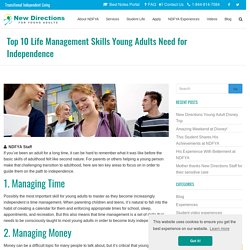
For parents or others helping a young person make that challenging transition to adulthood, here are ten key areas to focus on in order to guide them on the path to independence. 1. Managing Time Possibly the most important skill for young adults to master as they become increasingly independent is time management. When parenting children and teens, it’s natural to fall into the habit of creating a calendar for them and enforcing appropriate times for school, sleep, appointments, and recreation. 2. Money can be a difficult topic for many people to talk about, but it’s critical that young adults develop the ability to handle money independently. Knowledge of credit and interest is important to avoid getting pulled into scams, payday loans, and high-interest credit card debt. 3. Transportation has a huge impact on how all of us live our lives.
Adjusting to new responsibilities. Why are millennials so stressed. Quarter Life Crisis. Millennials, This Is What Your Quarter-Life Crisis Is Telling You. It was 2 months before my 25th birthday.

Everything in my life seemed upside down. My business was no longer exciting me, working out seemed mundane, and hanging out with friends felt like a chore. I started asking myself, do I really have the success that I thought I would have? Am I actually creating an impact on the world? Am I happy? I had found myself in a quarter-life crisis, or as The Muse puts it, “a period of intense soul-searching and stress occurring in your mid 20s to early 30s,” typically because you feel you’re not achieving your full potential or are falling behind.
According to The Guardian, the quarter-life crisis affects 86% of millennials, who report being bogged down by insecurities, disappointments, loneliness, and depression. Fortunately, the quarter-life crisis doesn’t have to be something to fear. Meet Robert MacNaughton, the cofounder and CEO of the Integral Center in Boulder, CO, an organization that is at cutting edge of personal and relational development. 1. The effect of stress on young people. This month is National Stress Awareness Month, a campaign set up to raise awareness of the growing impact stress has on society and outline the ways in which people affected can seek support.
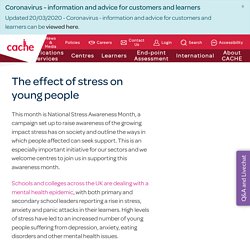
This is an especially important initiative for our sectors and we welcome centres to join us in supporting this awareness month. Schools and colleges across the UK are dealing with a mental health epidemic, with both primary and secondary school leaders reporting a rise in stress, anxiety and panic attacks in their learners. High levels of stress have led to an increased number of young people suffering from depression, anxiety, eating disorders and other mental health issues. To get a greater understanding of the factors causing mental health issues in young people, last year Barnardos published a survey on the main worries of children today and how they can be better supported.
Processing the Environment. How stress affects your body - Sharon Horesh Bergquist. How Some Stress Can Be Good For You, According to Experts. The Upside of Stress. Coping with Stress. Coping with stress - for young people. People feel stressed when they feel like the demands or pressures on them are more than what they can cope with.
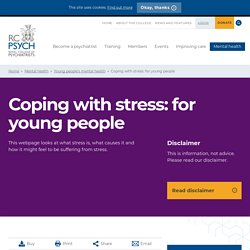
Everyone feels stressed at times. You may feel under pressure, worried, tense, upset, sad, and angry – or maybe a mixture of uncomfortable feelings. These feelings can be entirely normal, but sometimes stress can get too much and can even trigger a mental illness. Sometimes people try to ‘block out’ stress by using drugs or alcohol. This makes things worse in the long run. It is important to get help if stress is getting too much or you are using drugs or alcohol to try and cope.
What causes stress? There are many reasons why you might feel stressed. College students perception of stress and coping mechanisms Gallagher 2019. Coping with stress across thelifespan Amirkhan 2007.